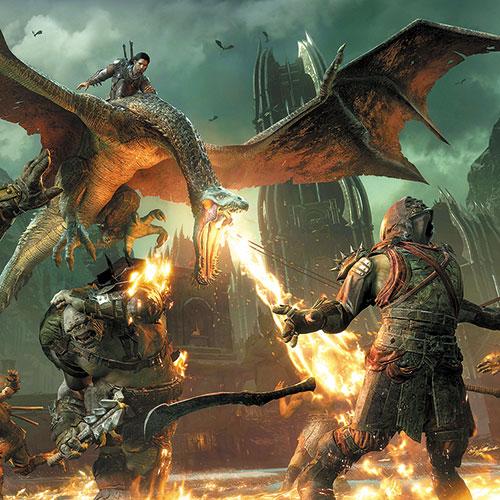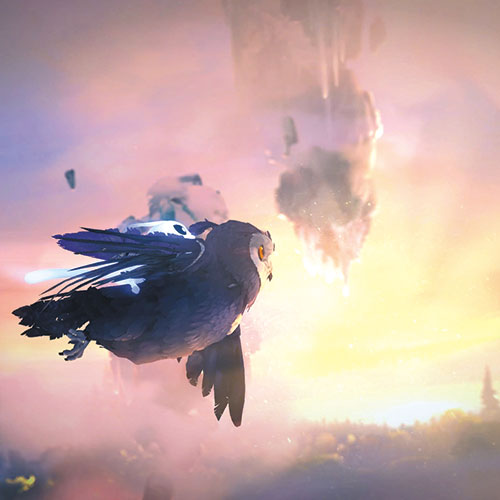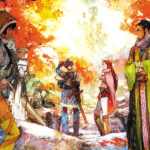Game Review: ‘Middle-earth: Shadow of War,’ a sandbox for predators

BY MATT MILLER | GAME INFORMER MAGAZINE (TNS)
Platform: PS4, Xbox One, PC
Genre: 1-Player Action/Role-Playing
Publisher: Warner Bros. Interactive
Developer: Monolith Productions
ESRB: M, for mature
Orcs scatter as my drake makes another pass over the fortress, breathing fire into their ranks as they scramble to cover. I leap off and dive hundreds of feet, landing in a shockwave that scatters allies and foes alike. In a flash of savage strikes, my essence magically splits into multiple forms, each a machine of destruction, holding the courtyard. My army of spiders crawls over the defenders, and giant cat riders gallop through the breach in the wall made by the siege beasts. The horde charges the inner keep, and I step through the shadows and instantly reappear on my flying mount to survey the chaos.
“Shadow of War” is a playground of intense and emergent action scenes shaped by your choices and triumphs. Across a vast territory of five open-world regions, hundreds of missions unfold, many appearing in direct response to your previous actions, and pitting you against individual named enemies that remember you between encounters. Whether in the opening minutes of stealth or the frenzied melees that inevitably follow, combat is rich and rewarding, offering dozens of ways to bring down the denizens of Mordor. The overriding sensation is that of a sandbox of super-powered predation and exploration in a world where you are the prime mover, and on a scale that dramatically outstrips its predecessor.
Developer Monolith exhibits a thorough understanding and deep love of Tolkien’s grand fantasy world and its themes, and I appreciate the constant ways the game nods to its source material. But the storyline for “Shadow of War” launches in its own over-the-top direction; “Middle-earth” fans who can leave their reverence at the door will find a rewarding tale drenched in the darker elements of the fiction. Dramatic reinventions of characters like Shelob and the nature of the Nazgûl feel strange at first, but viewed independently of Tolkien canon, the logical leaps are no more outlandish than other fantasy stories.
Continuing their quest for vengeance, Talion and Celebrimbor forge a new Ring of Power and set out to conquer Mordor. Rather than follow a single central plot, the story quickly splits along multiple threads, from confronting the threat of the ringwraiths to helping a beleaguered spirit hold back a cabal of necromancers. The pace is always brisk, but I enjoyed each of the largely self-contained plotlines, and the way they shed light on a land drenched in sorrow and warfare. Everything comes together in a satisfying final turn, setting up the canonical events of “The Lord of the Rings” and maintaining the open-world gameplay for some dramatic new twists post-campaign. The game suggests a story conceit for continued warfare after the central conflict has come to a head, and in a way that provides new toys to enjoy.
The nemesis enemy system presents a tremendous variety of adversaries and conflicts. I haven’t played another game with the same diversity and personality in its adversaries, and the number of spoken snippets to establish the characters is astounding. Distinct strengths, weaknesses, and quirks are meaningful when you fight them, and equally so once you dominate them and send them out to do your bidding. New nemesis missions and ambushing enemy captains pop up all the time, making it easy to get distracted by pitched battles and minor (but stubbornly challenging) objectives. Instead of pulling you out of the world, these complications deepen engagement with the world.
The systemic skirmishes reach their heights with the fortress assaults, in which dozens of combatants duke it out to control Mordor’s greatest bastions, with your customized army facing off against the worst Sauron can muster. I felt deeply gratified when my carefully planted spy betrayed and attacked a warchief, and appropriately devastated when my troll from the fighting pits finally fell to a hail of arrows as he defended my position.
With its brutal animations, explosive magical abilities, and breakneck pace, Talion’s engagements provide a potent power fantasy. The overwhelming odds he constantly faces are balanced by the flexibility of his attacks and counters. The game smartly recognizes moves you haven’t used, and optionally reminds you how to complete them to further grow your potential as an engine of ruthless efficiency. If there’s a flaw, it’s that enemies are often profoundly stupid, not seeing your stealth approach from only yards away, or blindly charging past an explosive barrel as you aim your detonating hammer throw. I enjoy the sense of mastery and control that emerges, even if at times I wondered at my enemies’ ineptitude.
Across dozens of hours, the endless dominations and frantic battles teeter toward sameness. The problem threatens the fun of the later sections, but the tedium is mostly kept at bay through constant skill unlocks, new weapons, and enemies of ever-increasing power. The skill and gear system is consistently absorbing; dozens of skills and their upgrades change the way you fight, from midair time-slowing bow shots to teleporting behind a target for a stealth kill. Weapons and armor often have entertaining abilities which improve if you proactively fulfill the challenges that each demand, such as landing headshots on five burning foes. Taken together, the progression dynamic provides constant goals and gains, keeping action fresh even as you progress long-term story quests and conquests.
From the hellscape of Gorgoroth to the sickly green of Minas Morgul, the five regions are a visual treat. Twisting caverns, deep pits, and towering mountains lend a needed geometry that “Shadow of Mordor” lacked, while the ruined walls, and outposts are perfect sites for stealth hunts and throwdown clashes. Faster wraith-powered speed boosts and leaps make long-distance traversal a breeze, and become even easier as you gain the ability to summon mounts like caragors and drakes. The world is filled with collectibles, but not so many as to feel like a chore; each expands the lore of the world or leads to exciting gear unlocks. The ease of navigation is further enhanced by a great map and fast-travel system. Like the battles themselves, the numerous regions of Mordor have a potential to bleed together after dozens of hours of adventure. While I would have enjoyed more unique gameplay tied to each location, Monolith has provided a massive playspace with a lot of artistic range.
While the adventure is solitary, “Shadow of War” has ways to connect with the broader world of players. Confronting online vendettas and fort conquests has players seeking revenge for defeated fellow players, or taking over players’ best protected castles. It’s a fun way to further expand an already sizable collection of tasks, and leads to significant rewards. However, the shape of gameplay is identical to your solo tasks, even if the details are slightly different. An online market of strong weapons and allies is available through both in-game currency and real money. The lure of microtransaction shortcuts is unappealing, but their optional nature and alternate (if slower) in-game paths to the same rewards make it no more egregious than equally banal systems in other contemporary games. They offer a quick way to get ahead, but diminish the value of the same rewards earned through playing. I was far more enthralled by a sword retrieved from an ancient elven barrow or my orc I’d leveled up through nemesis missions than I was from equally powerful rewards pulled from a random chest.
“Shadow of War” fulfills the promise of its predecessor, completing a dark and violent lost tale set within the world of “The Lord of the Rings.” I was initially frustrated by the liberties that Monolith takes with this beloved fiction (which are plentiful), but I eventually abandoned myself to the insanity, and fell down the rabbit hole into a superb fantasy adventure. Monolith captures the thrill of power with aplomb; the way it simultaneously speaks of its dangers and corrupting potential is the real magic.











